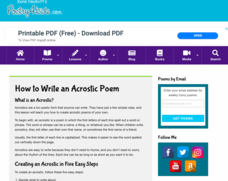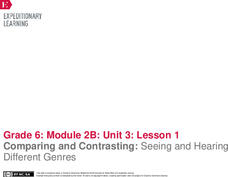Core Knowledge Foundation
Sixth Grade Poetry
Study some of the most prominent poets and works of poetry in history with a language arts poetry unit. From Virgil to Shakespeare to Dickinson to Angelou, the resources present biographies and examples of poetic elements to the sixth...
National Center for Families Learning
The Summer Fun Summer Learning Poetry Unit
Focus on poetry this summer to enhance those comprehension, fluency, and language skills with a set of resources intended to explore different types of poetry, specifically lyric poetry. The daily activities contain differentiation ideas...
Poetry4kids
How to Recite a Poem like an Expert
Don't just read a poem, recite a poem! Add speaking skills to a poetry unit with an activity that promotes successful poem recitation. Scholars choose a poem then recite it with the help of several tips and videos.
Annenberg Foundation
Rhythms in Poetry
Rhyme, rhythm, free verse, imagery: Do these words describe poetry, or jazz music? The answer is both! A resource explores these similarities as scholars watch a video, engage in discussion, read author biographies, write poetry and...
Poetry4kids
How to Write an Acrostic Poem
Acrostic poems are perfect for any topic! A quick tutorial guides learners into writing acrostic poems with the basics and key examples.
Macmillan Education
Understanding Poetry (Elementary)
Introduce young readers to poetry analysis with a instructional activity that uses Emily Bronte's "Spellbound" to model how poets use word choice, the sounds of words, the repetition of words, and rhyming patterns to create the mood,...
Academy of American Poets
Teach This Poem: "Violin" by Nikki Wallschlaeger
Nikki Wallschlaeger's Violin is the featured poem in a instructional activity that uses music and multiple readings to delve deep into its analysis. After a writing warm-up, learners watch and listen to a video that showcases Regina...
Geography 360°
Poetry Writing
Put the tips and tricks in this guide into practice in order to encourage your pupils to blossom into poets. A wonderful reference material for teachers, this packet includes definitions of poetic terms and forms as well as step-by-step...
Annenberg Foundation
Poetry of Liberation
How do writers use words to protest injustice, challenge the status quo, and shape their own identities? Individuals watch and discuss a video, read author biographies, write poetry and journals, develop a slideshow, and complete a...
Laura Candler
Bio Poems Made Easy
A creative way bring autobiographical writing to your poetry unit or back-to-school curriculum, this lesson plan guides you through a bio poem activity. Kids use the graphic organizer to describe themselves using adjectives, things they...
ReadWriteThink
Diamante Poems
The blank page can be a huge hurdle to overcome when writing a poem. Take that hurdle away with an interactive format that enables pupils to write elegant diamante poems. After they add the first and last words in two separate fields,...
K12 Reader
If
Rudyard Kipling's advice to his son in the poem "If" is a resounding message that echoes through generations. After reading the famous poem, middle schoolers work on analyzing specific lines, completing activities based on unfamiliar...
E Reading Worksheets
Tone Worksheet 1
Discern the tone in four selected poems with a straightforward assignment. Junior high readers analyze the authors' word choice and text structure to define a tone for each poem, as well as each poem's meaning.
EngageNY
Mid-Unit Assessment: Small Group Discussion: How Do Modern Poems Portray Modern Adversities?
How is a poem similar to and different from a news article? Pupils use a graphic organizer to compare and contrast the two genres. Also, as part of a mid-unit assessment, scholars participate in small-group discussions based on poetry...
Read Works
City Autumn
Glimpse a beautiful moment through poetry with a reading comprehension activity. As sixth graders read through "City Autumn" by Joseph Moncure March, they answer ten questions about the setting, mood, vocabulary, and punctuation of the...
EngageNY
Writing the Final Narrative: Monologue or Concrete Poem
Get inspired to help those creative juices flow. Using the resource, scholars write their final, best version of their narrative monologues or concrete poems. Next, they prepare for a performance task by watching and discussing a video...
E Reading Worksheets
Tone Worksheet 3
The interpretation of a poem often lies in the mind of its reader, especially when reading the tone. Focus on author's word choice, middle schoolers read four different poems and briefly state a perceived tone for each, along with the...
Louisiana Department of Education
Out of the Dust
The Grapes of Wrath may be the most famous novel set during the Dust Bowl, but what other stories cover the same time? The unit focuses on the Karen Hesse novel Out of the Dust. Learners keep a timeline of the Dust Bowl, maintain a...
EngageNY
Looking Closely at Stanza 1—Identifying Rules to Live By Communicated in “If”
Here is a lesson plan in which pupils connect themes and rules to live by from the story Bud, Not Buddy by Christopher Paul Curtis to those found in the poem If by Rudyard Kipling. First, scholars discuss their reading and review Bud's...
EngageNY
Introducing “If” and Noting Notices and Wonders of the First Stanza
After reading chapter 14 of the story Bud, Not Buddy by Christopher Paul Curtis, scholars take part in a read-aloud of the poem If by Rudyard Kipling and compare it to the reading of Bud, Not Buddy. Learners then go deeper into the poem...
EngageNY
Notices, Wonders, and Vocabulary of the Third Stanza of “If”
How does one's experience reading a poem's text differ from listening to its audio version? Delve into the insightful question with the poem, If by Rudyard Kipling, as pupils compare and contrast their experience using a note-taking...
EngageNY
Looking Closely at Stanza 3—Identifying Rules to Live By Communicated in “If”
Just as Bud, from the novel Bud, Not Buddy by Christopher Paul Curtis, had rules to live by, so does the poem, If by Rudyard Kipling, but how do the two relate? Pupils delve deep into the poem's third stanza, participate in a grand...
EngageNY
Comparing and Contrasting: Seeing and Hearing Different Genres
Let's compare and contrast! Scholars use a Venn diagram to compare and contrast the experience of reading a poem and listening to its audio version. Next, they complete graphic organizers, comparing two different genres: a poem and a...
EngageNY
Analyzing, Comparing, Sharing: Modern Voices
What do modern voices sound like? Scholars explore the topic, reading two concrete poems from John Grandit's Blue Lipstick and analyzing them using a graphic organizer. Next, they read a third poem and work with partners to look for...
Other popular searches
- 6th Grade Poetry Unit
- 2nd Grade Poetry Unit
- 3rd Grade Poetry Unit
- 7th Grade Poetry Unit
- 5th Grade Poetry Unit
- Poetry Unit Plans
- Poetry Unit Grade Three
- Modern Poetry Unit
- Poetry Unit Rhyme
- Huge Poetry Unit
- African American Poetry Unit
- Poetry Unit Jack Prelutsky

























